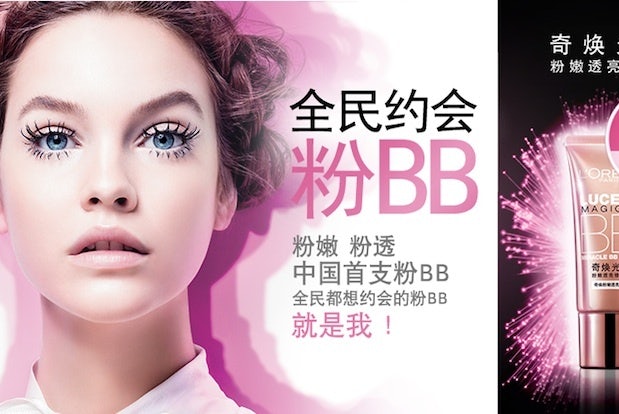
A Chinese-language ad from L'Oreal's website. According to Datawords, global brands should localize—not translate—their marketing campaigns in China. (L'Oreal)
When a luxury brand launches a global marketing campaign, it can be tempting to simply hire a translator to create a word-for-word version of its message to expand its reach to other countries. This strategy isn’t enough when it comes to resonating with Chinese consumers, says Alexandre Crazover, a founding partner of multilingual digital production company Datawords.
Crazover presented at China digital marketing conference China Connect in Paris last week to discuss his company’s focus on localizing, adapting, and deploying digital content for global brands. Jing Daily caught up with him to discuss his company’s experience with clients in the luxury industry, including fashion, cosmetics, and wine and spirits brands. Read the interview below to learn why an emphasis on not just translation, but localization is key when it comes to luxury marketing in China.
There’s been a lot of discussion among China marketers that marketing copy in Chinese must be original, not simply translated from English. What does your company think about this strategy and what approach does it take?#
At Datawords, we believe that localization is an integral part of any marketing strategy. Therefore, while we do our best to keep the heart of the marketing copy from its original language, we take into account local customs and user behaviors to best adapt and localize; this requires native-speakers to ensure that the user experience is optimum at every level.

Alexandre Crazover.
We accompany a great number of luxury brands into the Chinese market, but we consider that the success of our client is largely due to global teamwork. We are part of the success, but we also strongly believe in the following few do's and don’ts: to be aware of local regulations for doing business in China, especially if one wishes to trade online, to invest in a professional translation of one’s website and all marketing materials, and to adapt online advertising & SEM campaigns to popular Chinese platforms. It’s also important to offer multiple payment options and to invest in m-commerce platforms. Finally, we like to tell our clients to remember that speed matters and that security concerns should not be neglected!
What role does Chinese culture play when creating a Chinese-language marketing campaign?#
It’s a very important role, which we found is often underestimated by other actors. If you don’t take into account the local culture, you cannot launch a successful marketing campaign. As well, Chinese characters are a wonderful way to advertise in a funny manner because they can have so many different meanings through various combinations, and this variety is an incredible tool. We’ve been tasked by our clients to ensure that Chinese culture is respected, and to go beyond a literal translation, as our job truly encompasses so much more than that.
In the luxury sphere, you certainly have many non-Chinese clients from regions like Europe and North America requesting services for their China market presence. Have you received any interest from Chinese luxury brands hoping to go international? Do you think there will be more in the future?#
We are currently working with Asian brands and helping them deploy their marketing campaigns internationally. Nowadays, you have many innovative technologies and luxury goods coming from Asia, and we strongly believe that China, as well as other countries in Asia, will want to reach further markets and thus need agencies that will be able to guide them through perfect locations and adaptations of their marketing strategies.
Digital marketing campaigns involve many visual components such as video, imagery, and web design in addition to written copy. How important is language to the overall aims of a company’s campaign?#
Language is at the very root of any marketing campaign. While a picture may be worth a thousand words, nothing can quite match a written description of a product or the perfect catch phrase. Slogans such as Nike’s “just do it”, or Disney’s “the happiest place on Earth”, remain with customers much longer than any image or video. While this is just my personal opinion, I believe that visual components are there to reinforce the written copy, not supplant it.